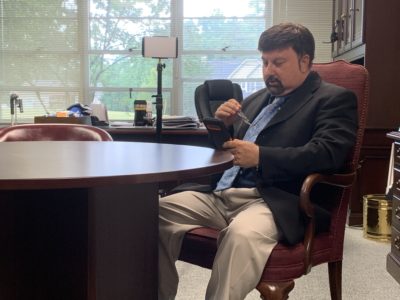

|
|
Danielle Howell Abbott lives in Statesville with her family: her husband, daughter, son and the former Mr. Biggles. According to her son, Eli, Mr.Biggles was a pirate who called the walls of Eli’s bedroom home when he was a toddler.
As young children let their imaginations run wild, this didn’t strike Abbott as concerning — did you ever watch D.W.’s imaginary friend Nadine on “Arthur”? As a matter of fact, Abbott giggled while reminiscing on the imaginary friend she let stay in her son’s room. But other behaviors surfaced later, causing Abbott to take a step back and tilt her head.
“Something was never quite right,” Abbott said. “He cluster fed and when he was about four months old, he never slept at daycare. As soon as we got home and I put him on my chest, he was out.”
These weren’t mere development abnormalities; Eli’s off behavior remained with him as he grew, causing trouble outside of the house.
“At school we knew things were bad,” Abbott said. “The teachers were sending him outside of his classrooms because he was disruptive.”
Abbott and her husband brought their concerns to Eli’s pediatrician. In hindsight, it’s as though he was being treated for the symptoms of autism – anxiety, depression, and behavioral troubles – rather than doctors intervening at the root of the problem itself – needing an official diagnosis. His doctor prescribed him an antidepressant, which helped tremendously in feeling more confident and less like an outcast at school, said his mother. However, something was still amiss, leading Abbott to bring Eli to UNC-Chapel Hill’s Treatment and Education of Autistic and related Communications Handicapped Children program (TEACCH) for an evaluation.
“We had to wait 18 months,” Abbott said. “At the time, [the school] didn’t give him any IEP (Individualized Education Program) services since he didn’t have the official diagnosis, but yet he still had all the symptoms and all the behaviors. He was getting speech services through school, but in the meantime I was doing whatever I could to get something going for him.”
According to Dr. Sarah Edmunds, clinical psychologist and assistant professor at the University of South Carolina, however, there’s dissonance amongst the two.
“In many states, there is a difference between a medical diagnosis of autism and an educational classification of autism,” Edmunds said. “And so, an educational classification of autism is absolutely enough to get services in school, but most parents seek a medical diagnosis of autism because it gives more pervasive service access – it unlocks insurance coverage, including Medicaid insurance coverage for therapies outside of school like speech, OT (Occupational Therapy) and ABA (Applied Behavioral Analysis).”
For Eli, this medical diagnosis was crucial in order to gain certain therapies through school that otherwise would have been out-of-pocket costs for his parents. According to Edmunds, at the core of this problem is a lack of resources; particularly, specialists who are trained in autism evaluations, leaving many children to suffer in the same way Eli did.
“Some school psychologists and other mental health professionals in the schools that would be doing an IEP evaluation to arrive at that classification of autism are so stretched thin,” Edmunds said. “There are not enough school psychologists or professionals in the district.”
This lack of resources proved true for Erin Surbaugh-Jones and her now 13-year-old son, Jackson, as they tried to get the proper assistance he needed within the Elizabeth City-Pasquotank Public Schools system.
There is no cookie cutter presentation of autism in children, hence its identification as a spectrum, with behaviors and capabilities varying on a case-by-case basis. Surbaugh-Jones detected signs in Jackson that fared far differently from those Abbott recognized in Eli. According to Surbaugh-Jones, Jackson had no interest in playing with children his age; rather, he wanted to be with the adults in social settings. He used to flap his hands. When he gets anxious, he’ll do things repeatedly in increments of threes for hours – whether it’s behaviorally or verbally – as a coping mechanism, according to Surbaugh-Jones.
While it was clear on the home front that Jackson was intellectually gifted but behaviorally challenged, at school this wasn’t as obvious and ultimately led to his parents pulling him out.
“‘He’s too smart for an IEP, he doesn’t need it,’” said Surbaugh-Jones, repeating the school’s cavalier response to her accommodation request for her son.
For Jackson, it was the behavioral aspect of his diagnosis that affected his ability to act appropriately in the classroom, rather than an explicit academic shortcoming. He was bullied on multiple occasions for his intellectual talents, starting as early as kindergarten when he was pushed down a staircase at school, said his mother. Similar scenes played out later, when he was kicked in the head and later beaten up.
To Edmunds’ point, it was clear for Surbaugh-Jones that not only were there not enough people advocating for Jackson, but that the resources afforded to him were dismal. While he would have been provided essential therapies if he still attended public school, as Surbaugh-Jones now home-schools him, other therapies outside of what the government regards as necessary become a privilege to get. In order to get occupational therapy services such as help with his balance and hand-writing — another behavioral aspect Surbaugh-Jones said the school wrote off — they would have to travel more than two hours by car to Raleigh for these services and pay for them out of pocket.
When schools fall short of providing children on the spectrum with adequate resources, families and their wallets are directly affected. The situation has proven so dismal that it forced John Stefano, whose son has autism, out of the state.
“In North Carolina we paid out of pocket for his ABA therapy, and we spent $2,000 to $3,000 a month just on that,” Stefano said. “I was begging (my wife) to go back to work — she’s a registered nurse — at a company that I knew had coverage. We just determined it was better for everybody just to move out of state to a state that had access to better resources.”
In Colorado, Stefano and his wife have found more accessible resources for their son, such as Medicaid waiver programs where Stefano’s income does not disqualify him for receiving aid.
The common denominator across the board, from Stefano back to Abbott, is that the government has yet to acknowledge, let alone hear out, the problems at hand for these families.
Doug Brown, father of two in Guilford County with one child on the spectrum, says there’s a disconnect.
“I think the misconception in Washington is that if you make over this arbitrary threshold then you can afford it,” Brown said with regard to affording autism-related costs.
President Joe Biden’s Build Back Better Plan, aiming to extend more resources to struggling American families, is on the hot seat in Washington right now. While the plan’s proposal includes buzzwords and phrases like “children,” “caregiving,” and “working families,” as it stands now, it does not address those in more unique positions, such as families having children with developmental impairments. What does free, universal preschool mean for a child who also needs speech therapy; is that included?
The need is felt amongst North Carolina families and, without question, across the country. The pressure, however, falls short of being felt amongst those in Washington.
Mr. Biggles no longer lives in Eli’s closet, but the atypical development track credible for his creation is still alive and well within Eli — but only a figment of the state’s imagination.





